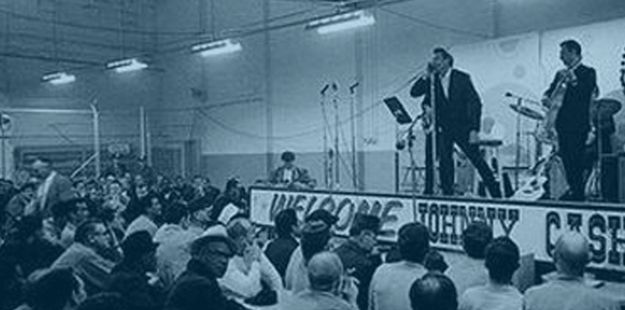Johnny Cash festival to honor 50th anniversary of Folsom Prison concert
by October 15, 2018 7:05 pm 2,330 views

Photo courtesy of Johnny Cash Trail.
The Man in Black was on the verge of losing it all. He was recently divorced, and drugs and alcohol continued to ravage Johnny Cash’s body and mind. He needed a comeback, and it was time to gamble.
Cash arrived at Folsom, a prison near Sacramento, Calif., on Jan. 13, 1968. His performance in front of about 1,000 inmates, became one of the most iconic moments in American music and resurrected his career.
The Johnny Cash Heritage Festival will celebrate the 50 year anniversary of the event in Dyess from Oct. 18-20. “Johnny Cash at Folsom Prison,” a video documentary written and produced by Michael Streissguth, a professor in the Department of Communication and Film Studies at Le Moyne College in New York, will be played at the Dyess Colony Visitor’s Center, on Thursday (Oct. 18). Released in 2008, the film provides a look at Cash’s 1968 concert for those inmates. The documentary includes recordings of the show with rare photos and interviews with those close to Cash. It will play at 2:30 p.m., and a discussion will follow.
The festival is coordinated through Arkansas State University Heritage Sites and licensed through the John R. Cash Revocable Trust.
A second film, “O Brother, Where Art Thou?” will show at noon the same day with Dr. Heath Carpenter, English professor from Harding University, serving as moderator of the discussion. Released in 2000, “O Brother, Where Art Thou?” is set in 1937 rural Mississippi during the Great Depression and includes music by one of the festival’s featured performers, Alison Krauss. The soundtrack from the movie won a Grammy for album of the year in 2001.
The movie was written, produced and directed by Joel and Ethan Coen and was based on Homer’s poem “The Odyssey.” It stars George Clooney, John Turturro, Holly Hunter and John Goodman.
John Alexander, author of the recently released biography of Johnny Cash that details the music legend’s life through his songs, will headline the list of symposium speakers Friday (Oct. 19). Alexander, a music journalist and historian, released “The Man in Song: A Discographic Biography of Johnny Cash,” published by the University of Arkansas Press in April. He has spent years studying the life and music of Cash from his Arkansas childhood through his 2003 death.
The festival will culminate Saturday (Oct. 20) with a concert in the field adjacent to the Cash Boyhood Home, a museum just outside of Dyess. Appearing with Krauss will be Jamey Johnson, Ana Cristina Cash, Suzanne Cox, Heather Berry Mabe and Ira Dean. Award-winning producer, artist and author John Carter Cash, son of Johnny Cash and June Carter Cash, is the festival host. Grammy winning artists Bill Miller and Shawn Camp are the two opening performances at the Saturday afternoon concert.
The Saturday field performances are the finale of the three-day festival that will feature educational and public presentations, arts and crafts, food, movie and regional music concerts Thursday and Friday in the Dyess Colony Circle. The academic theme for the festival is “The Ties That Bind.”
Cash spent his youth at the house that has been restored. ASU began restoration on the Cash childhood home in 2011. The dwelling was restored to its original condition, and an administrative building built into the old Colony theatre. The project cost about $3.5 million. The heritage festival began after a series of successful concerts were held at the ASU Convocation Center starting in 2011 honoring Johnny Cash’s legacy.
How the Cash family came to this desolate spot in rural Northeast Arkansas was a common story during a harsh bit of history. Drought, sporadic floods, and the Great Depression decimated family farms in the early 1930s. President Franklin Roosevelt started what was then called a socialistic plan to help many of these farmers in eastern Arkansas.
Ray and Carrie Cash brought their family to the Dyess Colony in 1935, according to historians. The Cashes moved to Dyess with their five children, Roy, 13; Louise, 11; Jack, 5; J.R., 3; and Reba, 1. Joanne and Tommy were born in Dyess.
During that era, the area was more swamp than usable farm ground. Workers drained the swamp and 500 farm families, including the Cash family received 40 acres and a mule through a federal government aid program. Rice and cotton were grown. Johnny Cash, along with his brother, Jack, worked the family farm and attended school. Work in the fields was grueling. At night, Johnny and Jack spent a lot of time in their room.
Jack died in a wood cutting accident as a youth. Music historians attribute Cash’s dark, brooding style to his brother’s unexpected death. Johnny served in the military after high school. He came home periodically to visit his parents. They moved to Memphis in 1956. Cash returned to his old homestead years after he became internationally famous with songs such as “Walk the Line,” “Ring of Fire,” and others.
